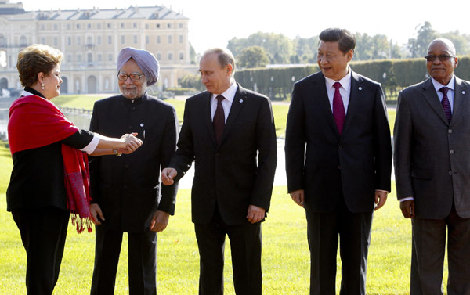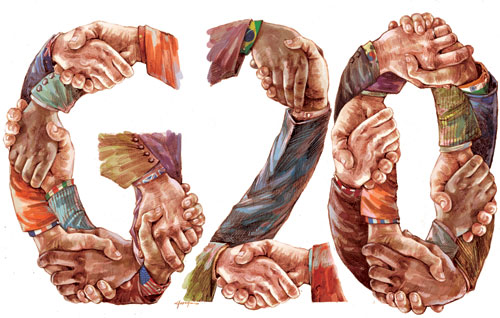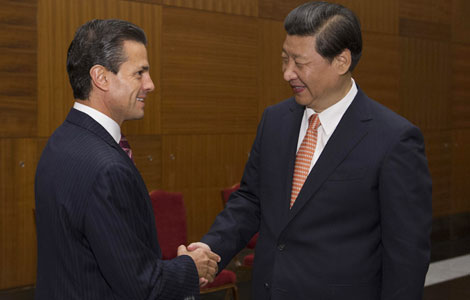Why combating tax evasion matters
Updated: 2013-09-06 07:05
By Stephan Richter (China Daily)
|
||||||||
We live in an era when the rapid integration of the global economy is causing great stress in the lives of many people. Workers in the manufacturing sector, regardless of their location and nationality, can lose their jobs in large numbers if the facility where they are employed is no longer productive enough. And in many a country, social benefits are being trimmed constantly to make the welfare state sustainable during conditions of rapid population aging.
Under such circumstances, it is politically explosive - and in a democracy ultimately self-defeating - to let some individuals go on in their belief that they, unlike most regular tax-paying citizens, do not really have to play by the rules.
In such a world, it is pivotal that people live and operate under the same set of rules. There cannot be one set for all regular wage earners, who have their taxes and other charges automatically deducted from their monthly wages, and another set for people who enjoy great "flexibility".
True enough, there is a whole raft of prominent banking institutions, accounting companies and law firms - never mind the myriads of shady operators in this field with much lesser names and completely dubious reputations - who make a rich living indeed from setting up and operating this netherworld of tax evasion.
But their activities do not happen in a social and political vacuum. Economic globalization has brought about a significant increase in terms of income inequality in most Western societies. That is even true of countries that traditionally put much more emphasis on equality and solidarity, as is the case throughout Scandinavia.
When that happens, public policy must take appropriate measures to ensure a clear sense of tax fairness and equity in domestic society. And if the effort to ensure that requires resorting to extraordinary and, yes, in the minds of some, illegal measures, then that is what is required.
The law is never an absolute category. It is ultimately the codification of a set of moral choices between various layers of conflict situations, as they are either known or anticipated to exist.
When tax authorities can obtain information that penetrates the otherwise impenetrable world of tax evasion, then clearly any government is within its proper rights if it chooses to take action against the truly immoral choice.
That truly immoral choice is not paying one's proper tax obligations, as required under the public laws of the land, no matter how clever, conniving and reassuring one's bankers, lawyers and accountants are. In such cases, it is immoral, and ultimately illegal, to protect the tax offenders for their self-claimed right to "privacy" or, more stupefying yet, protection under the "rule of law".
Anybody seriously considering the alternative just needs to ask this question: What happens to the internal fabric and moral fiber of a society where the vast majority plays by the rules (if only because they have no other choice), but a very small minority, already privileged with its high level of economic success, does not?
Under such circumstances, how can even the most basic notions of social and economic equity and fairness be upheld? Is it desirable in any conceivable way to have such an unfortunate separation - between the law-abiding "losers" and those who are merely treading in place (that is, the many) and those who consider themselves above the law (that is, the few)?
If the answer to any of these questions is no, then one must act accordingly.
It is issues such as combating tax evasion that give the all-important but abstract sounding goal of advancing the broader cause of global governance their real-life meaning.
Proper governance in the fields of global finance and the global economy means more than just rectifying the voting right in international financial institutions such as the World Bank and the International Monetary Fund, overdue as that is. For this important endeavor to find resonance among the wider public, the reform efforts must yield effects in daily life.
Combating tax evasion is precisely such an issue and a cause. It promotes the sense of fairness and a lived practice by all citizens to operate under the same rules and be wedded to advancing the life opportunities of all citizens and not just the most fortunate ones.
The author is the publisher and editor-in-chief of The Globalist.
The Globalist
(China Daily 09/06/2013 page9)

 China, Russia a step closer on gas supply
China, Russia a step closer on gas supply
 18-year-old panda conceives triplets
18-year-old panda conceives triplets
 Testing times for G20 leaders
Testing times for G20 leaders Homemade choppers make aerobatic stunt debut
Homemade choppers make aerobatic stunt debut
 Shanghai's visa-free policy lifts tourism
Shanghai's visa-free policy lifts tourism
 Panda twin cub born at Atlanta Zoo
Panda twin cub born at Atlanta Zoo
 Xi, Mexican president meet for third time
Xi, Mexican president meet for third time
 Samsung unveils smartwatch ahead of rival Apple
Samsung unveils smartwatch ahead of rival Apple
Most Viewed
Editor's Picks

|

|

|

|

|

|
Today's Top News
US service providers eye Chinese market
Brazil asks for apology from US on spying
Xi calls for closer G20 ties
China, Russia a step closer on gas supply
Commuter aviation expected to take flight soon
Japan to test wall for leaking water
18-year-old panda conceives triplets
Films aim for success abroad
US Weekly

|

|





